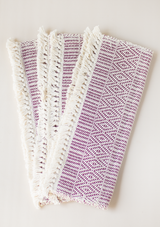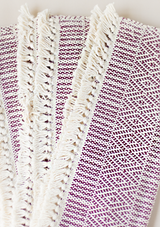Handwoven Burgundy Oval Placemats (Set of 4)
Handwoven Natural Cotton Placemats: Authentic Craftsmanship Meets Modern Elegance
Elevate your dining experience with our exquisite handwoven natural cotton placemats. Crafted meticulously on traditional looms, these placemats are more than just table decor—they are a testament to the enduring beauty of cultural heritage and artisanal craftsmanship.
Features and Benefits:
Eco-Friendly and Sustainable: Made with natural cotton threads, our placemats showcase a commitment to sustainability. Feel good knowing your purchase supports eco-conscious practices.
Unique Handcrafted Design: Each placemat is individually woven, making no two pieces identical. This uniqueness adds a personalized touch to your table setting, perfect for impressing guests.
Cultural Richness: Handwoven by skilled artisans in El Salvador, these placemats carry stories passed down through generations. Experience the warmth and history woven into every thread.
Fair Trade: By choosing our placemats, you support fair wages and ethical working conditions for artisans. This positively impacts their communities and promotes the preservation of traditional weaving techniques.
Women Empowerment: Our initiative empowers women in rural areas, providing them with stable, honest work. Your purchase contributes to their independence and the betterment of their families and communities.
Why You'll Love Them:
Imagine the satisfaction of setting your table with placemats that not only look stunning but also tell a story of resilience and tradition. The natural cotton texture brings a cozy, inviting feel to your dining area, while the intricate oval weaving design adds a touch of elegance. These placemats are not just functional; they're a conversation starter, a piece of art, and a way to bring a piece of Salvadoran culture into your home.
Transform your home decor with our handwoven natural cotton placemats. Embrace sustainability, support fair trade, and empower women artisans. Make a purchase that makes a difference.
Order now and add a touch of authenticity and elegance to your dining table!
- Size: 54cm x 32cm
-
Care instructions: Handwash or wash machine. Do not use bleach.
- 80% cotton and 20% polyester

INCOME

 The norm in rural areas is that children between the ages of 10 to 12 work the fields with their parents taking care of crops.
The norm in rural areas is that children between the ages of 10 to 12 work the fields with their parents taking care of crops.SCHOOLING


58% of the people that live in rural areas in El Salvador live in overcrowded conditions. When there is overcrowding in families, there is a higher risk of certain problems occurring, such as domestic violence, family disintegration, poor school performance, among others.

300 SALVADORANS TRY TO MIGRATE TO THE UNITED STATES DAILY DUE TO LACK OF WORK OPPORTUNITIES.
When Lula Mena began working in rural communities, many of the young women wanted to immigrate to the United States. Now that they have seen that there is an opportunity for a better life in their community, their perception of immigration has changed. They feel more confident that they will be able to provide for their families without having to leave the country. We want to continue to grow in order to offer more young adults the opportunity to work with us and avoid immigration.

One of the major challenges we faced when we began working with women was gaining the approval of their husbands. Most of the husbands and family members worried that the women would not be able to work and meet the household’s responsibilities.
Now, their husbands prepare dinner, take care of the children, and offer them support. There is still a strong sexist culture, “machismo”, in rural areas of El Salvador that we are trying to change by empowering women.





